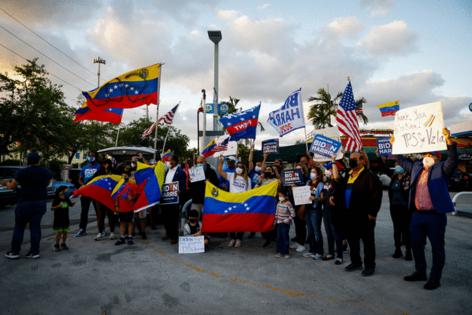Feds won't renew humanitarian paroles for Venezuelans, Haitians, Cubans and Nicaraguans
Published in News & Features
The U.S. government will not renew the humanitarian paroles under a Biden program that has allowed hundreds of thousands of Venezuelans, Haitians, Cubans and Nicaraguans to come to the U.S. over the past two years.
That means people who have used the two-year program to come to the U.S. and who do not have another way to stay will have to leave.
Department of Homeland Security officials confirmed to McClatchy and the Miami Herald that the agency will not renew the authorizations originally intended to provide a wave of migrants from Venezuela with a legal pathway to the United States even as the administration clamped down on illegal border crossings.
After the initial success of the Venezuela program, the administration extended the policy to nationals from Cuba, Haiti and Nicaragua, allowing them to arrive through U.S. airports as long as they pass health and background checks. The program was first announced for Venezuela in October 2022, and later extended to the other three countries in January 2023.
The parole program for Venezuelans will end later this month, and for Cubans, Haitians and Nicaraguans in January 2025.
The migrants who use the parole program are allowed to stay in the U.S for two years.
An agency spokesperson told the Herald that “the two-year period was meant to allow people to seek humanitarian relief or other immigration benefits for which they may be eligible, and to work and contribute to the United States.”
“Those who do not have pending immigration benefits or who have not been granted an immigration benefit during their two-year parole period will need to depart the United States prior to the expiration of their authorized parole period,” said the spokesperson. Otherwise, those people may be put in deportation proceedings if their parole expires and they haven’t left.
Over half a million people arrived in the U.S. through the program as of the end of August, according to government data. The first two-year paroles under the program are set to expire later this month.
The Biden administration has expanded Temporary Protected Status — which gives people from countries in turmoil deportation protections and work permits but does not lead to citizenship — to Venezuelans and Haitians who arrived in the United States through the summer of last year. Those who arrived under the parole program between October 2022 and the new dates for their country’s TPS designation may be able to stay.
Meanwhile, eligible Cubans will be able to apply for a green card under the Cuban Adjustment Act after a year and a day of entering the country.
But those who do not qualify for TPS, seek asylum, or have another legal avenue for immigration will have to leave the country. It’s unclear how many of the 500,000 people who have arrived under the parole program will no longer be entitled to stay in the U.S.
Patricia Andrade, president of the Venezuela Awareness Foundation, said that the decision to end the parole program “comes at the worst moment,” given the deteriorating situation in Venezuela, as leader Nicolas Maduro cracks down on the political opposition contesting his victory in the presidential elections in July, which are widely considered to have been fraudulent.
The parole program is a key cornerstone of President Joe Biden’s policies to reduce undocumented immigration through the U.S.-Mexico border. Officials credit the program with greatly reducing the volume of encounters with migrants from the four countries, which government data says is down over 99% in the time the measure was put in place.
The Biden administration has renewed a similar parole program for nationals of Afghanistan and Ukraine. Several presidents have previously used their parole authority to offer immigration protections to people from countries in turmoil.
But the parole program for Cuba, Venezuela, Nicaragua and Haiti has come under fire from Republicans, who say the policy is an abuse of presidential executive authority. Over a dozen Republican-led states challenged the program in federal court, but a judge in Texas dismissed the petition earlier this year.
Venezuelans in South Florida condemned the decision, saying that it would put many of their countrymen at risk should they be deported back to their home country.
“This extends the migratory disaster of this administration, in which you see them moving forward, and then moving backwards. Today they say one thing, and tomorrow they do another,” said Ernesto Ackerman, the conservative President of the Miami-Based Independent Venezuelan American Citizens.
The program also came under fire in August after the Department of Homeland Security paused the it after identifying fraudulent sponsorship applications. However, the agency said it had not detected any issues with the recipients. It resumed the program after creating new safeguards.
“Although it is true that there have been cases of fraud, cases in which the program was abused for profit, in most cases the program has served to help those living here in the United States to have a way to bring their relatives over,” said Jose Antonio Colina, president of the organization of Politically Persecuted Venezuelans in Exile. He told the Herald that this decision would cause problems because many Venezuelans have not yet found a permanent way to stay in the country or are still in the middle of their immigration processes.
“This could encourage Venezuelans, in the midst of their desperation due to the crisis that the country is experiencing, to venture out and try to enter the country in a disorganized way, as they did in the past.”
______
©2024 Miami Herald. Visit miamiherald.com. Distributed by Tribune Content Agency, LLC.







Comments